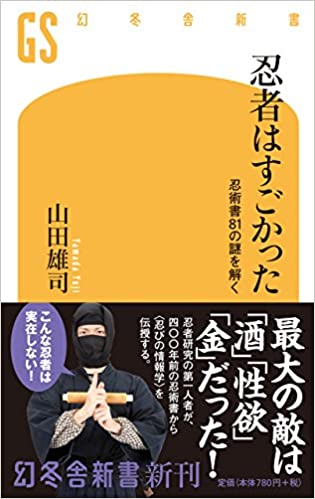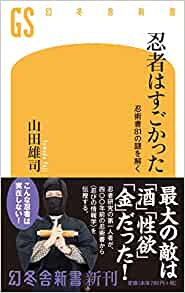またまた三重大学の山田先生の忍者本です。これは新書なので読みやすく、サブタイトル通り、忍術書の81の謎を解説してくれています。既に紹介した他の書籍と重なる内容もありますが、新たな気づきもありましたので、いくつか紹介します。詳細は本書をご確認ください。
忍者の心構えだと思いますが、「国の存亡は自分1人にかかっている」との覚悟を持って仕事をしていたようです。名声を求めない忍者ですが、戦が発生すれば、主君に忠節を尽くして大功を立てることだけを考えて仕事を行います。その際、主君の安否や国の存亡が自分一人にかかっている重責だと、心を戒めて事に臨みます。普通の人間では、なかなかできることではありません。
簡単に忍者の職務を復習すると、皆さんがイメージするように、戦国時代は、各地の大名に召し抱えられて、敵国へ侵入し、放火などの破壊活動を行いますが、大事なのは、敵方の情報収集を行い、自らの主君に伝える、インテリジェンス活動であります。派手な戦闘に与せず、生き延びて、戻って獲得した情報を伝えることが重要でした。だから、武士のように潔く死ぬことはあり得ず、何が何でも生きて帰ることが使命でした。
忍者の区分として、陰忍と陽忍があります。2種類の忍者がいるのではなく、1人の忍者がどちらにもなります。本書を引用すると、陰忍とは、我々が一般的に忍者について想像するような、目立たない衣装を着て、堀や堀を乗り越えて城や邸宅に侵入し、家の中に忍び込んで聞き耳を立てたり、重要な品を盗むことによって情報を得る手法のことです。他方、陽忍という手法は、日中に僧侶・旅人・芸能の民などに身を変えて潜入し、その土地の人と仲良くなって情報を得ることをいいます。このときには、あえて他所から来た者として振る舞う場合と、その土地の者として溶け込む場合があります。」
現代の忍者イメージは、隠忍でしょうか。変装して堂々と敵国に侵入する陽忍の方が、現在のスパイに近いかもしれません。(完)

忍者はすごかった 忍術書81の謎を解く (幻冬舎新書) [ 山田雄司 ]
価格:858円
(2021/7/3 12:05時点)
感想(1件)
The Ninja Were Awesome: Solving the Mystery of Ninjutsu Book 81
Another ninja book by Prof. Yamada of Mie University. This is a new style book, so it is easy to read, and as the subtitle says, it explains 81 mysteries of ninjutsu books. Some of the contents overlap with other books I have already introduced, but I found some new insights, so I will introduce some of them here. Please check this book for details.
I think it is the mindset of a ninja, but it seems that he worked with the determination that “the survival of the nation depends on me alone. Although he was a ninja who did not seek fame, if a war broke out, he would do his work with the sole intention of being loyal to his lord and achieving great success. In doing so, he would face his duty with a mind of caution, knowing that the safety of his lord and the survival of his country depended solely on him. It is not easy for ordinary people to do this.
To briefly review the duties of the ninja, as you may imagine, in the Warring States period, they were recruited by feudal lords from all over the country to invade enemy territory and carry out arson and other destructive activities, but the important thing was to gather information about the enemy and convey it to their own lord. It was important to survive, not to give in to flashy battles, and to return and pass on the information acquired. Therefore, they could not die gracefully like the samurai, and their mission was to return home alive at all costs.
There are two categories of ninja: yin shinobi and yo-shinobi; there are not two kinds of ninja, but one ninja can be both. To quote from this book, the yin ninja are what we generally imagine about the ninja, a method of gaining information by wearing inconspicuous costumes, climbing over moats or moats to break into castles and mansions, and sneaking into houses to listen in or steal important items. On the other hand, the yo-nin method refers to infiltrating during the daytime by changing oneself into a monk, a traveler, or an entertainer to befriend the local people and obtain information. At this time, one may dare to act as someone from elsewhere, or one may blend in as a local.”
The modern image of the ninja is that of the hidden ninja. The yōshinobi, who disguise themselves and enter enemy territory with impunity, may be closer to today’s spies. ( End )

フランス人が日本人によく聞く100の質問全面改訂版 フランス語で日本について話すための本 [ 中井珠子 ]
価格:2,640円
(2022/1/3 17:33時点)
感想(0件)
Les Ninjas étaient géniaux : Résoudre le mystère du Ninjutsu Livre 81
Un autre livre sur les ninjas par le professeur Yamada de l’université de Mie. Il s’agit d’un nouveau style de livre, donc facile à lire, et comme le dit le sous-titre, il explique 81 mystères des livres de ninjutsu. Certains contenus se recoupent avec d’autres livres que j’ai déjà présentés, mais j’ai trouvé de nouvelles idées, donc je vais en présenter quelques-unes ici. Veuillez consulter ce livre pour plus de détails.
Je pense que c’est l’état d’esprit d’un ninja, mais il semble qu’il travaillait avec la détermination que “la survie de la nation ne dépend que de moi”. Bien qu’il soit un ninja qui ne cherche pas la gloire, si une guerre éclatait, il ferait son travail avec la seule intention d’être loyal envers son seigneur et d’obtenir un grand succès. Ce faisant, il ferait face à son devoir avec un esprit de prudence, sachant que la sécurité de son seigneur et la survie de son pays ne dépendaient que de lui. Il n’est pas facile pour les gens ordinaires d’agir ainsi.
Pour passer brièvement en revue les devoirs des ninja, comme vous pouvez l’imaginer, à l’époque des États en guerre, ils étaient recrutés par les seigneurs féodaux de tout le pays pour envahir le territoire ennemi et se livrer à des incendies criminels et autres activités destructrices, mais l’important était de recueillir des informations sur l’ennemi et de les transmettre à leur propre seigneur. Il était important de survivre, de ne pas céder aux batailles tapageuses, de revenir et de transmettre les informations acquises. Par conséquent, ils ne pouvaient pas mourir dignement comme les samouraïs, et leur mission était de rentrer chez eux vivants à tout prix.
Il existe deux catégories de ninja : les yin shinobi et les yo-shinobi. Il n’y a pas deux sortes de ninja, mais un ninja peut être les deux. Pour citer ce livre, les yin shinobi sont ce que nous imaginons généralement des ninjas, une méthode pour obtenir des informations en portant des costumes discrets, en escaladant des fossés ou des douves pour s’introduire dans des châteaux et des manoirs, et en se faufilant dans des maisons pour écouter ou voler des objets importants. D’autre part, la méthode yo-nin consiste à s’infiltrer pendant la journée en se transformant en moine, en voyageur ou en amuseur pour se lier d’amitié avec la population locale et obtenir des informations. À ce moment-là, on peut oser se faire passer pour quelqu’un d’ailleurs, ou se fondre dans la population locale.”
L’image moderne du ninja est celle du ninja caché. Les yōshinobi, qui se déguisent et pénètrent en toute impunité en territoire ennemi, sont peut-être plus proches des espions d’aujourd’hui. ( Fin )
